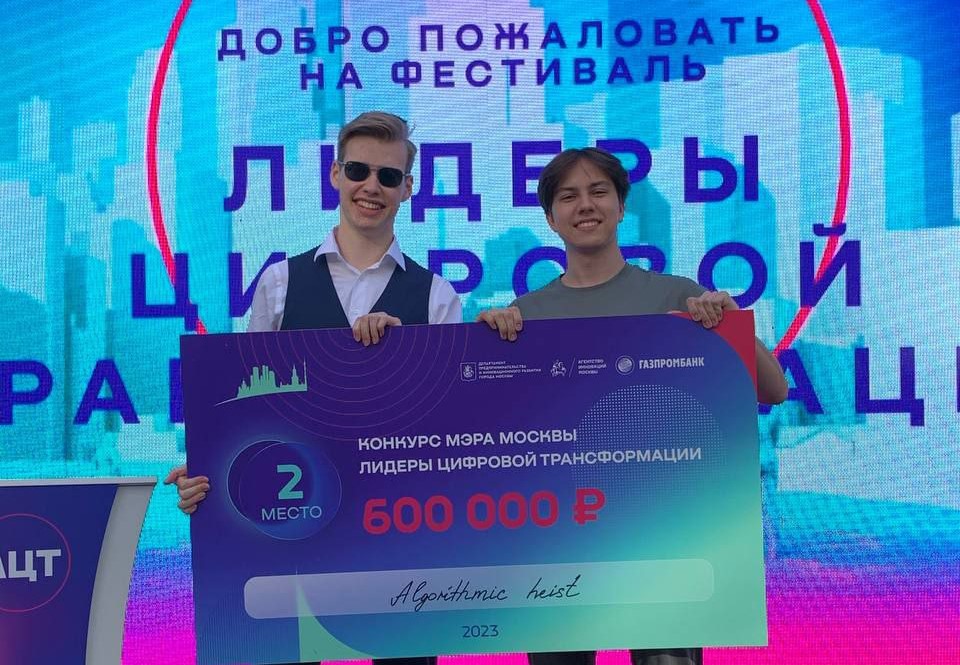First-year HSE Students Take Prize in LDT-2023 Hackathon

HSE University’s team Algorithmic Heist was among the winners of the 5th-anniversary Leaders of Digital Transformation hackathon, one of the country’s major IT competitions. More than 7,000 programmers, analysts, designers, marketers, project engineers, and IT entrepreneurs from across Russia and 37 other countries took part in the hackathon. The competition ended with a three-day final and an award ceremony held in Moscow in mid-June.
The hackathon tasked 1,103 teams with developing solutions to real practical problems for the city and businesses. The contestants communicated directly with experts and customers, attended lectures, and participated in a job fair. A total of 63 teams competed in the finals for the 42-million-rouble prize pool. In the end, 21 teams were awarded first place, receiving 1 million roubles each. The Algorithmic Heist team—made up of HSE students Sergey Volnov, Nikita Chervov, and Pavel Ilyin—was among the participants who took second place (and 600,000 roubles). They created an effective model of building optimal routes for ATM cash logistics for Gazprombank, minimising the cost of armoured collection vehicles.

Sergey Volnov
The team decided to work on Gazprombank’s task because it combined machine learning with competitive programming, explained Sergey Volnov, first-year student of HSE University’s Applied Mathematics and Information Science bachelor’s programme. ‘We are particularly good in these areas, so we liked the case at once,’ he said. ‘It was necessary both to build ML models, for example, to predict the cash inflow to the terminals, and to solve optimisation problems when plotting routes and choosing ATMs. That’s where we used many approaches from the world of competitive programming.’
This year, Aeroflot, Gazprombank, Ozon, Severstal, the Russian Environmental Operator, Sitronics Group, PIK, Samolet, Tada.team, and Whoosh were partner companies of the competition.
The students explained that this is not the first time they have participated in hackathons, as they offer a great opportunity for professional growth. ‘First of all, you get a lot of hands-on experience solving real problems and working with a team,’ said Sergey Volnov. ‘Second, due to the tight deadlines, you learn quickly and get much more knowledge than from training courses of the same duration. And, of course, it is an opportunity to win the prize money.’

Pavel Ilyin
Pavel Ilyin, first-year student of the Bachelor’s in Applied Data Analysis and Artificial Intelligence educational programme at HSE University in St Petersburg, admitted that the team was almost sure it would reach the finals. ‘We thought we would get into the top three. We expected to win, but we were happy to get second place nevertheless,’ he said. ‘We came up with a good algorithm for predicting the inflow of money to ATMs, making it possible to effectively plan collection routes for weeks ahead, while the planning algorithm itself requires minimal costs—only 5–10% more than our bottom estimate of the minimum optimal cash collection costs.’

Nikita Chervov
‘This is the largest hackathon in Russia, with many strong participants and interesting challenges,’ commented Nikita Chervov, first-year student of the Applied Mathematics and Information Science programme. The other teams presented many effective solutions in the finals, he added. ‘We were glad to take the prize. And we also noticed that the winning team’s solution was slightly less optimal than ours, but they performed additional tests, which earned them the victory. We will take this into account,’ Nikita Chervov concluded.

